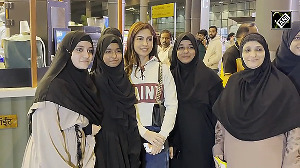Rejecting the suggestion by the United States and some other western States that the proposed Human Rights Council should be an independent body, India has said it should be a subsidiary of the General Assembly and be 'less amenable' to 'manipulation' by any power.
The US and its allies want the council to replace the Geneva-based Human Rights Commission and would like to keep those who, they consider, to be violators of human rights out of the body.
They argue that the commission has become a body in which those who themselves are worst violators try to shield one another and thus has outlived its purpose.
-
Also see: Iran vote and after
However, some of the developing countries have expressed the fear that if the US suggestion is accepted, it might lead to increasing interventions on the plea of human rights violations.
"India regards human rights as a shield for protecting ordinary people and not as a sword for intervention," India's Ambassador to the UN Nirupam Sen said, participating in the informal consultation on the issue in the General Assembly on Wednesday.
He suggested the council must have a membership of 50 based on equitable geographical representation. This, he argued, is necessary on the ground of universality as also functionality.
Such a council, he said, would be 'less amenable' to manipulation by a power or a group of powers and ensure that not just political and civil rights but social and economic rights, including the right to development and to work, are effectively articulated in the council Sen also stressed the need for the Council to address 'massive' human rights violations by non-State actors. On account of civil conflicts in many parts of the world, he said, there have been massive violations of human rights by non-State actors.
If the proposed council only holds States responsible for rights violations, its work would be vitiated by one-sidedness. Hence the necessity for the council's mandate to provide for addressing rights violations by non-State actors, he said.
Besides civil and political rights, Sen spoke of the role of the State in ensuring socio-economic equality and solidarity internationally in promoting the right to social and economic development. Also, he said, people have the right to benefit form common human heritage of mankind, to a healthy and balanced environment and to humanitarian disaster relief.
The UN and the proposed Human Rights Council, he told the delegates, could play a crucial role in promoting international cooperation to make these rights a reality since they are based on cooperation between people and States.
The world leaders at their summit in September had agreed to the constitution of the council but had left the details about composition and mandate to be worked out by diplomats.





